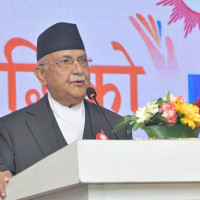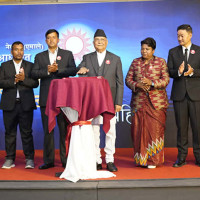- Friday, 20 February 2026
Nepal's Quest For Political Stability
A civilian rebel won the election with overwhelming votes against party candidates. The event occurred in a metropolitan city with educated voters. In another instance, a rebel campaigned in a remote area. He challenged the party's high command and gained greater popularity than any other candidate. Unfortunately, he lost, though his vote count was encouraging. In the former case, the parties labelled it as betrayal, while in the latter, popular opinion alleged, “Votes purchased!” Then the public added, “Parties are losing their charm!” The million-dollar question: Are political parties losing faith, or are the leaders, indeed? Why is the popularity graph on a downward trend for the once-popular candidate, akin to a market in bulls and bears?
Both cases of win and lose end with a universal lesson on the weakness of political leaders. Consider one party in question, terming it the ruling power, and the other, not in power, as the opposition. Whichever the case, each has the record and experience of being in and out of power by turns. The context here is that if one is in power, another is in waiting. As elections approach, they field candidates for parliamentary representation. Each party burns massive calories and resources to secure the seats required for a majority government. Their destiny hinges entirely on the voters' verdict, embracing one and rejecting the others. If a party candidate wins, they are popular among the voters. Results are unpredictable; nevertheless, a candidate who secures a substantial vote count in one election may forfeit their security deposit in the next. If an independent candidate wins, both the candidate and the voters are often labelled as rebels. Some opportunists take advantage of this and establish a new party with new faces, briefly perplexing the voters.
Now, what if the new face wins? Curiosity at its core is: Why was the new face accepted? Politics is thus a graphical illustration of bulls and bears. The established party then reflects on the reasons for the loss. It had spent a huge amount, had the hustings, and wooed the voters; why such a shameful defeat yet? Here comes the point: why should a new face win? This question has multiple-choice answers: 1. The party is old; 2. The candidate was unpopular; 3. The candidate has already been represented once or twice; 4. The candidate lost closeness to the voters; 5. The candidate and the party both were not in the constituency's welfare; 6. The candidate and the party were not transparent in financial deals, etc. Many more possible answers can be added to the list.
Government by majority
The challenge is not that rebel candidates or new parties emerge in a democratic context. Then the constitution instructs them: one party to lead, while other parties join the government and make an absolute majority. Akin to the Hindu faith in multiple gods, no? Now, what next? Consequently, a government is as fragile and fissile as a lump of ashes. This coalition government then overshadows their election manifesto.
The persistent question remains: will such a government work? The prime minister’s talent and election manifesto carry no significance there. One aspect highlights the definitive policy barriers. The government resolves it with a common minimum programme. Another aspect is instability right from the start. Like its predecessor, it is similarly ineffective. As a result, critical areas like agriculture, land policy, rural and urban development planning, industrialization, education, health, social security, and the preservation of culture and heritage exhibit no signs of success. It affects not only the parties but also democracy and the nation. It may talk a lot about development planning, but it focuses more on government making, breaking, and remaking. Each phase of making and remaking storms in horse-trading. Selective portfolio cabinet berth for the parties takes weeks before a full-fledged government functions. Irony then takes a twist about loyalty. Who is the minister to be loyal to? To the mother's party? Or to the prime minister? Here is why the nation in its entirety is overshadowed! Sensitive and pressing concerns and issues like the nation’s borders and international relations assume no priority there. Thus, as soon as the band completes the cabinet, it has infirm and fickle footsteps and starts limping with a mere inner desire to survive. Unfortunately, it is devoid of policy steps! Its one glaring example is the randomly urbanised Kathmandu Valley, which has been without regulatory outlines for many decades. The result? An unending line of concrete houses now stands on either side of wide or narrow lanes in both old and new residential settlements. Unfortunately, the residences assume no safety standards and essential utility services such as electricity, waterlines, and optical fibres for telecom and emergency aid.
With all this, the valley now has an illusion of identity: is it an ancient city of culture and heritage of Hindu and Buddhist shrines flanked by traditional mud houses of tiled roofs, or of skyscrapers and a concrete jungle? The cities in it now confuse the utility providers, as pedestrians and vans rarely experience a thoroughfare. Just check in: as one agency completes its repairs, another begins digging the same spot, causing discomfort to vehicles, parking lots, and sidewalks.
What are the results? The lanes have become congested, and endless lines of concrete structures stand out without a city plan and forecourt green shrubs. Emergency vans and fire trucks are similarly stranded, with sirens blaring at a polluting level. Another questionable decision is that of a former prime minister who chose the central secretariat spaces of Singh Durbar for new high-rise structures like parliament buildings. By now, Singh Durbar has lost the open spaces for lush greenery that it could have had. Many more such disorders have affected the nation’s administrative system, bureaucracy, domestic and international policies and agreements, and beyond.
Nepal first
Features of Nepal’s party politics, on the whole, are volatile. No prime minister, no government, and no electoral dynamics have been stable for the last seven decades to appease the public and the nation. The chief concern here is the cycle of instability. To redress this all, the nation needs 100-year development outlines and directives, irrespective of any government or any party rule.
Such a plan shall provide thorough guidelines to regulate future governments and bureaucracies. It’s good that parties confidently unite and form a government. It is quite encouraging to know that they are connected to protecting the Constitution. But now they have to gain people’s confidence too and say, “Nepal first” under the above bold vision.
This vision shapes a common minimum programme, serving as the nation’s manifesto for more responsive and effective democratic governance. Pakistan’s recent election results have indicated an alarming trend. Over one hundred independent candidates have emerged there due to sheer public frustration. The reason is people’s scepticism in any country. If people are sceptical, the government may sense a fear of systemic failure. This fear element gives rise to cruelty because the government raises firearms for its protection. This can spark the nation into public turbulence when the government intervenes against smooth welfare actions. In reality, Nepal desires a prime minister who prioritises 'Nepal First.' Nepal is tremendously rich in its resources, and politics is not for demagogues.
(Baral is a retired lecturer of English)
















